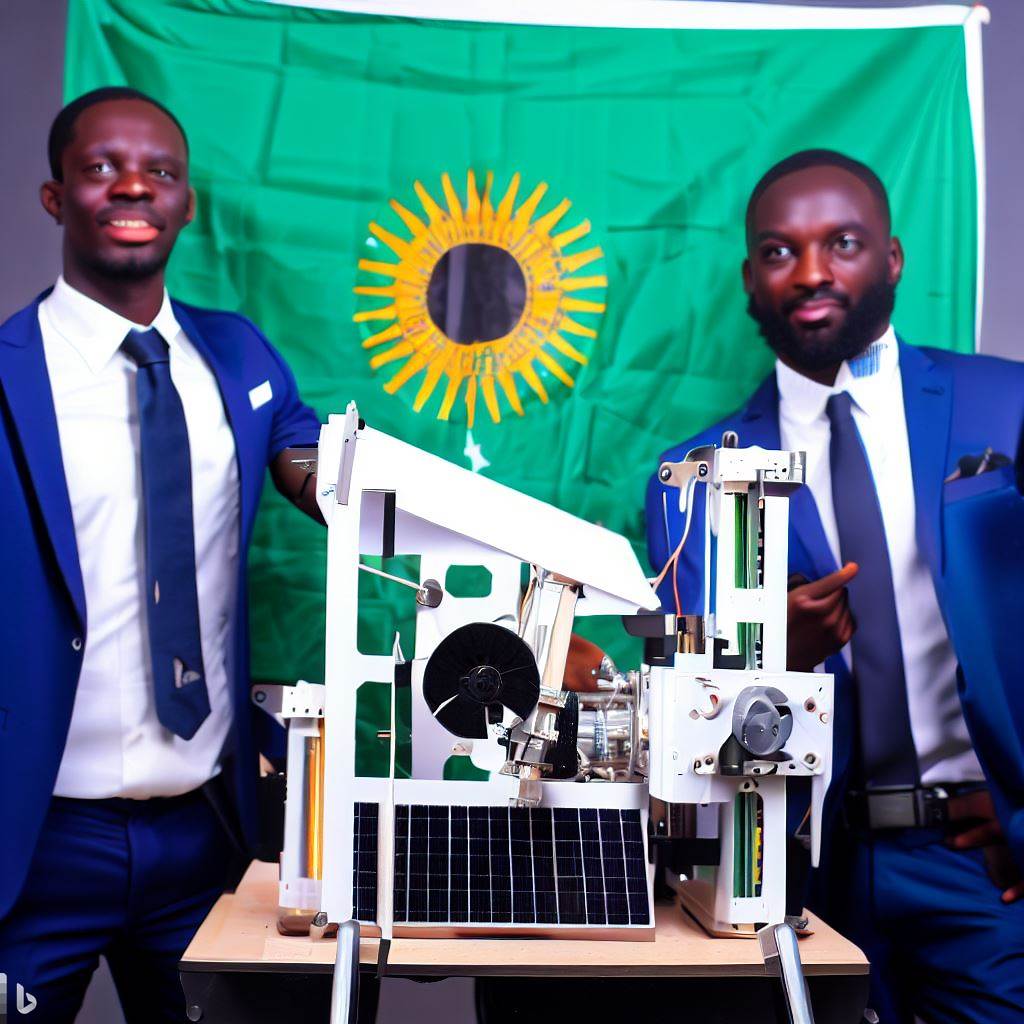Introduction
Let’s dive deep into the impact of global trends on opto-mechanical engineering
Global trends encompass worldwide patterns and changes. In opto-mechanical engineering, these trends influence the design and development of optical devices by merging optics and mechanics.
Nigeria is relevant to the topic as it is a country affected by global trends in opto-mechanical engineering.
Overview of Global Trends
Rapidly Evolving Technological Advancements Worldwide
The world is experiencing a rapid advancement in technology, with groundbreaking innovations emerging every day.
These technological advancements have significantly impacted various industries, including opto-mechanical engineering.
New and improved tools, processes, and materials have revolutionized the field, allowing engineers to create more innovative solutions.
Artificial intelligence, automation, robotics, and machine learning are just a few examples of technological advancements transforming opto-mechanical engineering.
Impact of Globalization on Engineering Fields
Globalization has had a profound impact on engineering fields, including opto-mechanical engineering in Nigeria.
With the increase in international trade and communication, engineers are now more interconnected than ever before.
Globalization has led to the transfer of knowledge and expertise across borders, allowing engineers in Nigeria to learn from global best practices.
Furthermore, globalization has resulted in the integration of diverse perspectives and ideas, fostering innovation within the field.
Engineers in Nigeria have the opportunity to collaborate with professionals from different countries, contributing to the growth and development of opto-mechanical engineering.
Global Trends Affecting Various Industries
- Sustainable Development: Global trends towards sustainability and environmental consciousness have greatly impacted industries, including opto-mechanical engineering.
Engineers now focus on developing eco-friendly solutions that minimize environmental impact and promote a greener future. For example, the use of renewable energy sources and the development of energy-efficient technologies have become prominent in opto-mechanical engineering projects. - Industry 4.0: The fourth industrial revolution, known as Industry 4.0, has introduced automation and digitization into various industries, including opto-mechanical engineering.
Advancements in Internet of Things (IoT), big data analytics, and cloud computing have transformed the way engineers design, manufacture, and maintain opto-mechanical systems. These advancements have led to increased efficiency, reduced operational costs, and improved overall performance in the field. - Miniaturization: The demand for smaller, lighter, and more portable devices has driven the trend of miniaturization in many industries.
Opto-mechanical engineering has embraced this trend by developing compact and lightweight optical systems. From smartphone cameras to medical devices, miniaturized opto-mechanical components are becoming increasingly prevalent, offering improved functionality and convenience. - Advanced Manufacturing Techniques: Global trends in advanced manufacturing techniques, such as additive manufacturing (3D printing), have revolutionized the production process in various industries, including opto-mechanical engineering.
3D printing allows engineers to create complex designs with intricate geometries, providing greater design flexibility and faster prototyping. This technology has also enabled the production of customized opto-mechanical components, tailored to specific requirements, resulting in enhanced performance and reduced costs.
In the end, global trends, such as rapidly evolving technology, globalization, sustainable development, Industry 4.0, miniaturization, and advanced manufacturing techniques, have had a significant impact on opto-mechanical engineering in Nigeria.
Engineers in Nigeria must adapt to these trends, embracing new technologies and approaches to stay competitive in a rapidly changing world. By doing so, they can harness the opportunities these trends present and contribute to the growth and development of the field.
Read: Salary and Compensation for Opto-Mechanical Engineers in Nigeria
Opto-Mechanical Engineering in Nigeria
Overview of the Current State of Opto-Mechanical Engineering in Nigeria
In recent years, opto-mechanical engineering has gained significant prominence in Nigeria. The field focuses on the integration of optics and mechanical systems to develop innovative solutions.
Nigerian engineers are involved in various industries such as telecommunications, manufacturing, and biomedical.
Opto-mechanical engineers in Nigeria design and develop optical systems, devices, and instruments. Several Nigerian companies have emerged as key players in the opto-mechanical engineering sector.
The Importance of this Field in the Nigerian Context
Opto-mechanical engineering plays a crucial role in accelerating technological advancements in Nigeria. It enables the development of cutting-edge optical products and solutions.
This field is vital for enhancing communication networks, healthcare systems, and scientific research.
Nigeria’s economic growth can be significantly boosted by leveraging opto-mechanical engineering. Investments in research and development in this field can attract foreign collaborations and investments.
Challenges and Opportunities for Opto-mechanical Engineers in Nigeria
One of the primary challenges is the limited availability of specialized opto-mechanical engineering programs in Nigerian universities.
There is a shortage of skilled professionals, leading to a high demand for opto-mechanical engineers.
Infrastructure limitations and inadequate funding hinder the growth of the opto-mechanical engineering sector. Nigerian opto-mechanical engineers face competition from global counterparts due to the lack of local expertise.
However, this field also offers numerous opportunities for innovation, entrepreneurship, and career growth. Nigerian opto-mechanical engineers can contribute to enhancing healthcare, communication, and security systems.
The government and industry should collaborate to provide training and create a conducive environment for opto-mechanical engineers.
Overall, opto-mechanical engineering is experiencing steady growth in Nigeria, with several Nigerian engineers making significant contributions across various industries. Leveraging the importance of this field in the Nigerian context can lead to economic development and technological advancements.
However, the challenges of limited educational programs and skilled professionals need to be addressed to fully realize the potential of opto-mechanical engineering in Nigeria. With the right support and investment, opto-mechanical engineers in Nigeria can play a key role in transforming the country’s technological landscape.
Read: How Opto-Mechanical Engineers are Shaping Nigeria’s Future
Impact of Global Trends on Opto-Mechanical Engineering in Nigeria
Influence of Global Trends on Practices and Developments in Opto-Mechanical Engineering
In today’s interconnected world, global trends play a crucial role in shaping various industries, including opto-mechanical engineering. As Nigeria strives to develop its engineering sector, it becomes imperative to understand and adapt to these trends for sustainable growth and technological advancement.
One significant global trend affecting opto-mechanical engineering in Nigeria is the increasing demand for precision and cutting-edge technology. This demand stems from the rapidly evolving global market, where advanced optical and mechanical systems are required to meet complex challenges.
Nigerian engineers need to stay updated with these trends to design and develop innovative solutions to compete at an international level.
Another influential trend is the integration of artificial intelligence (AI) and machine learning (ML) into opto-mechanical engineering practices.
AI-powered systems have the potential to revolutionize the field by enhancing automation, precision, and efficiency. Nigerian engineers should embrace this trend to improve their design process, reduce errors, and enhance overall product quality.
Furthermore, there is a growing emphasis on sustainable and eco-friendly engineering practices globally. Opto-mechanical engineers in Nigeria should align their practices with these environmental trends by developing energy-efficient and environmentally-friendly solutions.
Embracing sustainable practices not only aligns with global standards but also promotes long-term economic and social benefits.
Positive Impact of Global Trends on Nigerian Engineers
Global trends in opto-mechanical engineering present numerous opportunities for Nigerian engineers to expand their knowledge and skill set. Exposure to international standards and practices allows Nigerian engineers to sharpen their expertise and enhance their competitiveness in the global job market.
Furthermore, global trends foster collaboration and knowledge sharing among engineers worldwide. Nigerian engineers can benefit from networking with professionals from different countries, sharing experiences and expertise, leading to new ideas and innovative solutions.
This collaboration contributes to the overall growth of the sector and helps Nigerian engineers gain exposure to international projects and opportunities.
Additionally, global trends encourage a culture of continuous learning and professional development. Nigerian engineers can access online resources, webinars, and training programs offered by international organizations, allowing them to stay updated with the latest advancements in opto-mechanical engineering.
This exposure helps Nigerian engineers acquire new skills, diversify their knowledge, and stay at par with global industry standards.
Address the potential negative consequences and challenges posed by global trends
While global trends bring numerous positive impacts, they also pose certain challenges to opto-mechanical engineering in Nigeria. One potential consequence is an increased reliance on imported technology.
Global trends often promote the use of advanced machinery and equipment that may not be readily available in Nigeria. This dependence on imports can hinder the growth of domestic manufacturing capabilities and lead to a technological gap.
Moreover, global trends may present affordability challenges for Nigerian engineers. The cost of adopting advanced technologies and the expenses associated with staying updated on global trends can be prohibitive for engineers with limited resources.
This financial barrier may limit their ability to compete with international firms and hinder their professional growth.
Additionally, cultural and societal factors may create resistance to change. Nigerian engineers may face resistance from local communities or traditional practices when introducing new technologies or sustainable engineering solutions.
Overcoming these cultural challenges will require proper awareness campaigns, education, and local community engagement to build trust and acceptance.
In short, global trends play a significant role in shaping opto-mechanical engineering practices in Nigeria. By embracing these trends, Nigerian engineers can seize numerous opportunities for professional growth, knowledge sharing, and collaboration.
However, they must also navigate challenges such as technological dependencies, financial barriers, and cultural resistance. By addressing these challenges, Nigerian engineers can leverage global trends to strengthen the opto-mechanical engineering sector and contribute to the overall development of the nation.
Read: Innovation and Flight Engineering in Nigerian Aviation

Ways to Leverage Global Trends
Strategies for Nigerian Opto-Mechanical Engineers to Adapt and Leverage Global Trends
- Stay updated on the latest global trends in opto-mechanical engineering through industry publications and conferences.
- Invest in research and development to align Nigerian engineering practices with global standards.
- Establish partnerships and collaborations with international companies to gain exposure to global trends.
- Create a culture of innovation within Nigerian opto-mechanical engineering firms to stay ahead of global competition.
- Encourage engineers to acquire cross-cultural competencies to effectively navigate global markets.
- Seek opportunities for technology transfer and knowledge sharing with global experts.
- Launch initiatives to create awareness about the potential benefits of global trends among Nigerian engineers.
- Engage with professional networks and organizations that facilitate international collaborations.
Examples of Successful Case Studies or Initiatives in Nigeria
- The establishment of the Optics and Photonics Society of Nigeria (OPSN) which connects Nigerian engineers with global experts and encourages collaborations.
- The adoption of advanced manufacturing technologies by Nigerian opto-mechanical companies, leading to increased productivity and competitiveness.
- The implementation of a government-funded scholarship program that enables Nigerian engineers to study abroad, gaining exposure to global trends.
Successful Case Studies or Initiatives in Nigeria
In the rapidly evolving field of opto-mechanical engineering, continuous learning is crucial to stay up to date with global trends.
This can be achieved through professional development programs, online courses, and networking with international experts.
Collaboration plays a vital role as it allows Nigerian engineers to leverage the expertise and resources of global counterparts.
Collaborative projects facilitate knowledge sharing, technology transfer, and innovations that benefit both Nigerian engineers and the global community.
Continuous learning and collaboration not only enhance the capabilities of Nigerian opto-mechanical engineers but also help establish Nigeria as a significant player in the global engineering landscape.
By adapting to and benefiting from global trends, Nigerian engineers can contribute to the economic growth and development of the country while also fostering international partnerships.
Read: Innovative Projects by Opto-Mechanical Engineers in Nigeria
Government and Industry Support
The Role of Government Policies and Interventions in Promoting Opto-Mechanical Engineering
The Nigerian government has played a crucial role in promoting opto-mechanical engineering through various policies and interventions.
Government policies provide a supportive environment for engineers by creating conducive conditions for research and development.
Investment in research and development is crucial for the growth of opto-mechanical engineering as it encourages innovation and technological advancements.
Government interventions in the form of grants and funding opportunities provide financial support to engineers, enabling them to pursue their projects.
By offering tax incentives and waivers for companies in the opto-mechanical industry, the government attracts more investments and encourages growth.
Additionally, the government has established partnerships with educational institutions to enhance the quality of technical education in the field.
These collaborations facilitate the design of industry-relevant curricula and ensure a steady supply of skilled engineers.
The Importance of Industry Collaboration and Support for Growth in the Field
Industry collaboration and support are vital for the growth and development of opto-mechanical engineering in Nigeria.
Collaboration between industry and engineers allows for the exchange of knowledge and expertise, leading to innovation and improvement in the field.
Industry support provides engineers with access to state-of-the-art facilities, equipment, and resources necessary for their research and projects.
Companies in the industry can offer internships and job opportunities to engineering students, fostering practical learning and skill development.
Industry input also ensures that engineering programs are aligned with industry needs, preparing graduates for successful careers in the field.
Furthermore, industry collaborations can result in the creation of local manufacturing plants, reducing reliance on imports and promoting economic growth.
Read: Universities Offering Robotics Engineering in Nigeria
Exemplary Collaborations: Government, Industry, and Engineers Forge Successful Partnerships and Initiatives
Several successful partnerships and initiatives between the government, industry, and engineers have positively impacted opto-mechanical engineering in Nigeria.
The Opto-Mechanical Engineering Society (OMES), supported by the government and industry, plays a pivotal role in promoting the field.
OMES organizes conferences, seminars, and workshops to facilitate knowledge sharing and networking among engineers, researchers, and industry leaders.
The government, in collaboration with industry players, has established research centers dedicated to opto-mechanical engineering.
These centers serve as hubs for innovation and research, fostering collaboration between engineers, academia, and industry experts.
Successful initiatives like the Opto-Mechanical Innovation Challenge have encouraged engineers to come up with innovative solutions to industry challenges.
Through this challenge, engineers receive support, mentorship, and funding to develop their ideas into tangible products or technologies.
These initiatives have helped Nigeria establish a stronger footing in opto-mechanical engineering on both national and international levels.
In general, government policies and interventions, along with industry collaboration and support, have significantly influenced the growth and development of opto-mechanical engineering in Nigeria.
By creating favorable conditions, providing financial support, and fostering collaborations, the government and industry have paved the way for innovation and success in the field.
Successful partnerships and initiatives have further reinforced Nigeria’s position as a hub for opto-mechanical engineering, ensuring a promising future for the industry and its engineers.
Conclusion
To recap, this blog post discussed the impact of global trends on opto-mechanical engineering in Nigeria. It emphasized the significance of these trends in shaping the field of opto-mechanical engineering in Nigeria.
It is important for readers to stay updated, adapt, and make the most of these trends in their careers.




